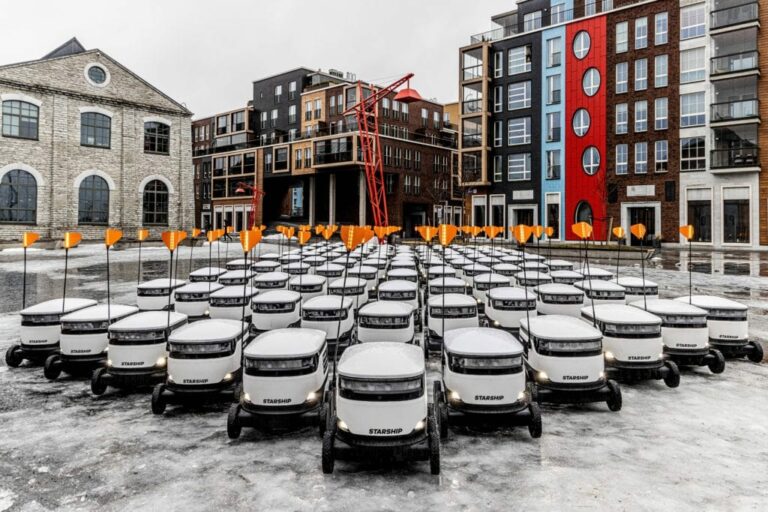TL;DR:
- Starship Technologies, known for its autonomous delivery robots, has raised €83.6 million in funding led by Plural and Iconical.
- This funding brings the total capital raised to €213.7 million since its inception in 2014, with the aim to expand globally.
- The investment will be used to further develop AI, technology, and wireless charging infrastructure.
- Starship’s Delivery as a Service (DaaS) product integrates robots into partner delivery networks.
- The company has completed over six million deliveries across 80 locations worldwide, reducing carbon emissions by 1.8 million kg.
- Starship’s robots are highly autonomous and excel in various challenging scenarios.
- Wireless charging technology is being introduced, enhancing last-mile delivery efficiency.
- The company’s decade-long dedication and technological advancements position it for accelerated growth.
Main AI News:
Starship Technologies, the trailblazing company that has turned science fiction into reality with its fleet of delivery robots, has just announced a remarkable funding round. Co-led by Plural and Iconical, the investment has raised a staggering €83.6 million. This funding catapults Starship’s total capital raised to a remarkable €213.7 million since its inception in 2014. The primary goal of this infusion of capital? To expand its footprint globally and capitalize on the ever-growing demand for home deliveries.
This substantial investment will enable Starship to continue harnessing the power of AI and machine learning to refine its technology and expand its wireless charging infrastructure. This expansion is particularly vital as Starship embarks on its journey to make its mark in even more international markets. The company is poised to revolutionize the delivery landscape, thanks to its innovative Delivery as a Service (DaaS) product, which seamlessly integrates Starship robots into the delivery networks of its partner businesses.
Since its launch in 2014, Starship’s delivery robots have become a common sight on streets across Europe and the US. Today, the company proudly claims the title of the world’s leading autonomous delivery service, having successfully completed over six million deliveries, reshaping last-mile delivery in the process. These robots can be found in 80 locations worldwide, including the US, UK, Germany, Denmark, Estonia, and Finland. They utilize significantly less energy than human counterparts while efficiently delivering takeout orders, groceries, tools, and corporate documents directly to customers’ doorsteps.
Ahti Heinla, Co-founder and CEO of Starship Technologies, remarked, “Autonomous delivery isn’t a far-off concept from a sci-fi movie; it’s a daily reality for hundreds of thousands of people. Building a company like Starship requires a decade of perfecting technology, optimizing operations, and reducing costs to make large-scale autonomous last-mile delivery not only viable but sustainable. Now, we’re prepared to conquer the world, with aspirations to establish a dominant presence that transforms the daily lives of millions across the globe.“
Impressively, each Starship robot can operate for 18 hours on a full charge, with the average delivery consuming no more energy than boiling a kettle for a single cup of tea. Starship’s robots have collectively reduced carbon dioxide emissions by nearly 1.8 million kilograms since their launch. Moreover, by prioritizing robots over low-wage human riders navigating through traffic, the company has championed an ethical and sustainable business model, earning the trust of esteemed customers such as Bolt, Co-Op, Grubhub, and Sodexo.
Taavet Hinrikus, Partner at Plural, expressed their enthusiasm, saying, “Starship is the global leader in autonomous technology, proudly built in Europe. Over the past decade, the team has relentlessly worked to create the world’s most advanced autonomous logistics technology. They’ve logged more miles and completed more deliveries than any other company, all while reducing the environmental impact of last-mile and on-demand delivery. This decade-long dedication, coupled with this latest funding, positions Starship perfectly for accelerated growth. We look forward to supporting Ahti and the team in their quest to become one of Europe’s most successful global enterprises.”
Starship’s journey to make autonomous delivery a commercial reality has been a decade in the making, marked by tireless technology refinement. These robots are an astonishing 99% autonomous and can adeptly navigate challenging scenarios and obstacles, from snow-covered streets to rocky terrain and unexpected roadblocks. On average, they cross three intersections every second worldwide. It took six years for Starship to reach one million deliveries, and they accomplished the next five million in half that time.
Recently, Starship achieved another groundbreaking milestone by introducing wireless charging for its robots at George Mason University in the US. In an unprecedented move, Starship robots can now autonomously recharge wirelessly between deliveries. The company plans to roll out this wireless charging solution worldwide in the coming months, further enhancing efficiency in the last-mile delivery process and realizing its vision of creating a fully autonomous system that can be seamlessly deployed at scale.
Over the past decade, Starship has assembled a world-class team comprising engineers, data scientists, designers, and operations specialists. This talented team is at the forefront of driving sustainable, autonomous logistics into the future. With members based at the company’s founding office in Tallinn, Estonia, and its global headquarters in San Francisco, Starship’s reach extends across the US, UK, Denmark, Finland, and Germany. This marks the dawn of a new era in autonomous, sustainable delivery, and Starship Technologies stands firmly at its helm.
Conclusion:
Starship Technologies’ substantial funding and continued innovation signal its determination to dominate the autonomous delivery market. With a strong focus on sustainability and advanced technology, the company is well-positioned to reshape last-mile delivery services worldwide, appealing to a growing demand for efficient and eco-friendly solutions.

